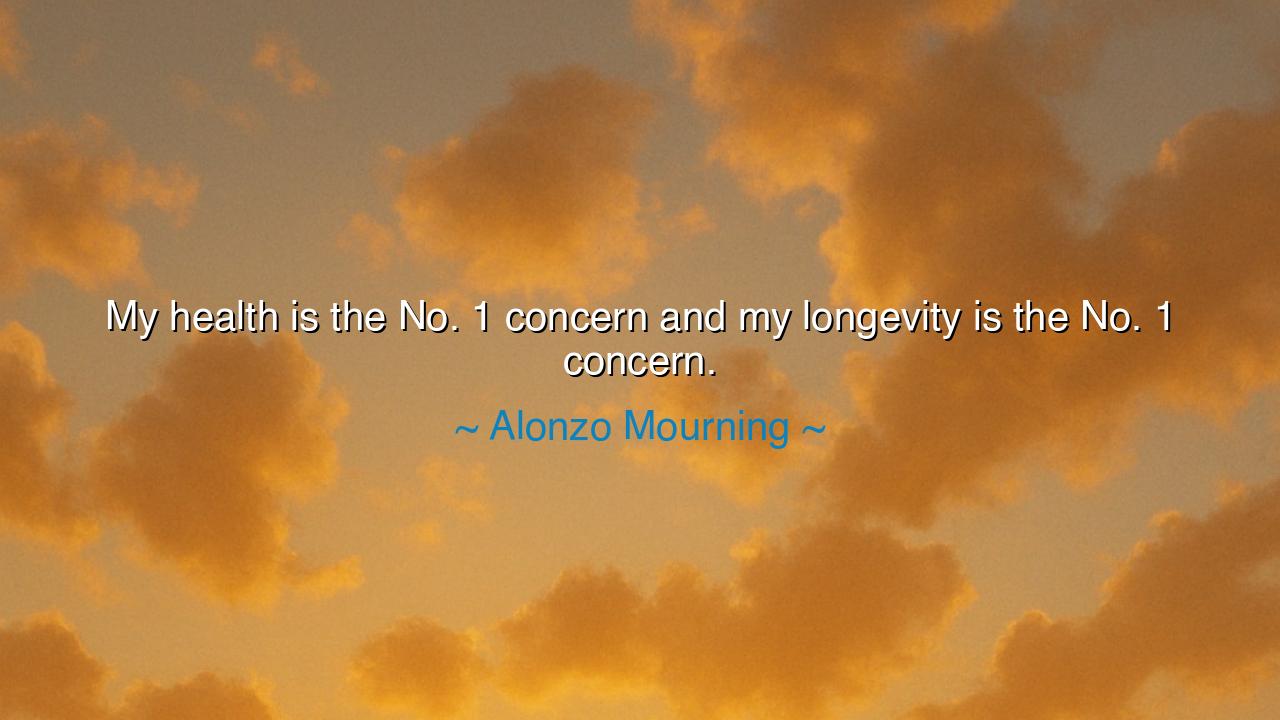
My health is the No. 1 concern and my longevity is the No. 1






The words of Alonzo Mourning, “My health is the No. 1 concern and my longevity is the No. 1 concern,” are not merely the reflections of an athlete—they are the declaration of a man who has faced the edge of mortality and chosen wisdom over vanity. In the ancient spirit of those who understood the sacredness of the body—the temple of the soul—his statement echoes like a timeless reminder: strength, glory, and victory are fleeting, but health and longevity are the true treasures of life. When the body falls, ambition fades; when health fails, the spirit, no matter how mighty, becomes shackled.
Once, Alonzo Mourning was a warrior on the court—a titan of basketball, known for his power and unyielding will. Yet when illness came to him in the form of a rare kidney disease, it stripped away the illusion of invincibility that youth and success often bring. From the pain of his struggle, he learned a lesson that transcends the world of sport. Like the Stoics of old who saw suffering as the great teacher, Mourning came to see that true strength lies not in how high one can leap or how loud the crowd cheers, but in the ability to endure, heal, and rise again with gratitude for life itself.
This revelation mirrors the wisdom of the ancients. The Greek physician Hippocrates taught that harmony of body and spirit was the foundation of virtue; the Chinese sage Lao Tzu wrote that he who knows how to preserve life walks the path of the Tao. Mourning’s words are a modern echo of these eternal truths: no crown, no wealth, no fleeting fame is worth the price of one’s well-being. When a man learns to place his health above all else, he aligns himself with the rhythm of nature and the order of life itself.
There is power in humility, and Mourning’s declaration is a hymn to that power. For a man who once defined himself through dominance, to say that longevity—not conquest—is his foremost concern, is to show a transformation of the soul. He no longer sought the fleeting fire of victory but the enduring flame of life. Just as the ancient warriors learned to temper their swords, he learned to temper his spirit—to guard his body as a sacred vessel rather than a tool of pride.
In this way, his story becomes not just an athlete’s tale, but a parable for all who chase success heedless of their limits. We live in an age where the pursuit of achievement blinds us to the fragility of our flesh. We sacrifice sleep for progress, peace for ambition, and nourishment for speed. But Mourning’s words rise like a clarion call through the noise: Without health, there is no tomorrow. Without longevity, there is no legacy.
Consider the philosopher Epictetus, who said that one must care for the things within one’s control—the body, the mind, the soul—and release all else. Mourning’s journey embodies this truth. He faced the storm of disease with discipline, underwent a kidney transplant, and returned to the court—not to prove his strength to the world, but to prove to himself that life, when cherished, can overcome even the shadow of death.
Thus, let his words be our teaching: guard your health as the ancients guarded their sacred fires. Let your concern not be for the applause of the moment, but for the quiet strength that endures through the years. Nourish your body with care, your mind with peace, and your heart with gratitude. For longevity is not merely the length of days—it is the art of living wisely, fully, and with reverence for the gift of being alive.
And so, when you rise each morning, remember this simple truth: your greatest wealth is your health, your greatest victory is your vitality, and your greatest achievement is the long, steady flame of life that no storm can extinguish.






AAdministratorAdministrator
Welcome, honored guests. Please leave a comment, we will respond soon